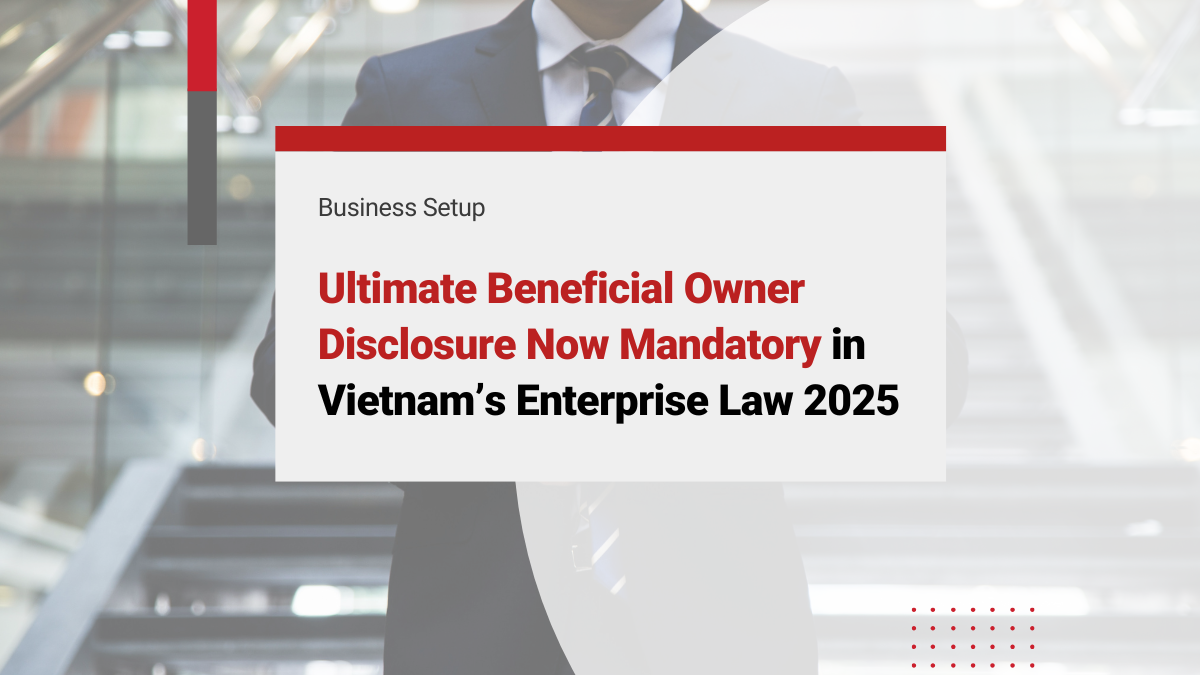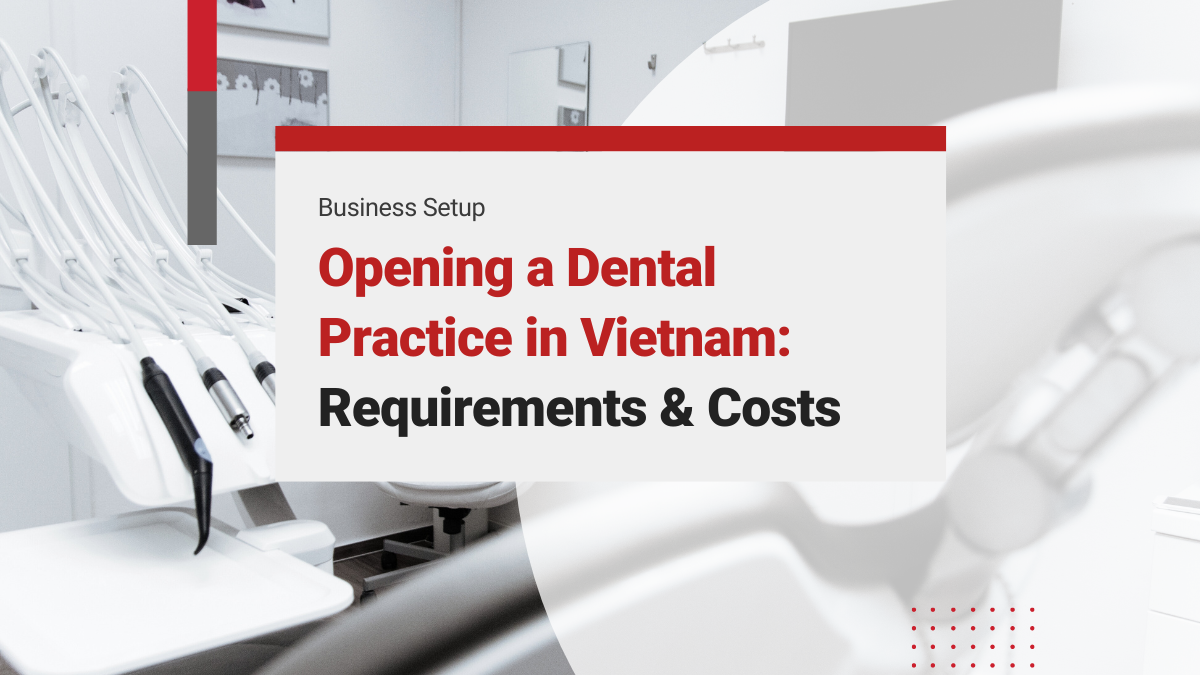Need to prepare for a tax audit for your representative office in Vietnam? This comprehensive guide explains what to expect during a tax audit, the focus areas for tax authorities, the necessary documentation, and the risks of non-compliance. Ensure your representative office is ready for a smooth and efficient audit process with up-to-date knowledge of Vietnamese regulations.
Understanding Tax Audits for Representative Offices in Vietnam
Jack Nguyen, CEO of InCorp Vietnam, explained:
“Representative offices don’t generate revenue and aren’t subject to corporate income tax (CIT). That’s why tax audits focus on expenses to ensure compliance. Audits are now more frequent, especially during closure, when a final audit is mandatory.”
A key compliance requirement is the submission of an annual activity report to the DOIT by January 30 each year. This report summarizes the RO’s operations for the previous year. Timely and accurate filing of this report is crucial, as delays or omissions can raise red flags during a tax audit. In addition, representative offices must pay the annual business license fee (also known as license tax) of VND 1 million by January 30 for each year of operation. Fulfilling these annual obligations helps demonstrate the RO’s compliance and can prevent complications or penalties during an audit.
During audits, tax officers often make frequent data requests and inquiries. This can be overwhelming if records are disorganized or incomplete. It is wise to maintain a robust record-keeping system so that cashbooks, bank statements, invoices, contracts, and payroll records can be retrieved quickly upon request. Having all required documentation readily available not only speeds up the audit process but also instills confidence in the auditors that the RO is well-managed. In contrast, poor record management can prolong the audit and invite deeper scrutiny.
Read More: Navigating Vietnam’s Tax Landscape: Expert Accounting Outsourcing Strategies
Key Points of Tax Audits for Representative Offices
Tax audits for representative offices in Vietnam predominantly focus on verifying expenses rather than revenue, as these offices do not independently generate income. Because ROs are not allowed to engage in profit-generating business activities or issue VAT invoices themselves, the audit centers on whether the office’s expenditures have been made for legitimate business purposes and are properly supported by documents. Every transaction—rent, salaries, office supplies, travel, etc.—may be examined to ensure it complies with tax regulations and anti-money laundering rules.
Although representative offices are not required to use Vietnam’s enterprise accounting system or prepare full financial statements as a company would, it is highly advisable to keep detailed expense records and supporting documentation. Every expense should be well-documented with the appropriate invoice or receipt, contract, and explanation of its purpose. Proper documentation of expenses can prevent challenges during the audit—for example, tax authorities will disallow any claimed VAT input credit or deduction if the corresponding invoice is not a lawful tax invoice (e-invoice) or if it lacks required details. In the context of an RO, disallowed input VAT simply becomes a non-recoverable cost, and excessive or non-compliant expenses could lead the tax office to impose personal income tax adjustments or penalties.
Another key point is timing: tax audits of an RO are commonly triggered when the RO dissolves or deregisters its tax code. Before allowing an RO to close, the tax authority will perform a comprehensive audit of its entire period of operation. To prepare for this, an RO should ensure that all annual reports have been submitted and all tax obligations (PIT, license fees, etc.) are up to date. Being proactive and maintaining compliance throughout the office’s life will make this closure audit much smoother. Even during active operations, an RO should operate in a state of “audit readiness,” since audits can occur with short notice especially if the tax office spots irregularities or conducts random inspections.

Personal Income Tax (PIT) Filing and Payment
A representative office must declare its Personal Income Tax (PIT) returns during its operation. The RO must register for a tax code and file PIT returns for its staff during its operation. By default, PIT filings are made on a monthly basis – the deadline for filing the monthly PIT return and paying the tax is the 20th day of the following month. For example, PIT withheld in January must be declared and paid by February 20. It is crucial to meet these deadlines to avoid late payment interest and potential penalties.
Note: If the representative office has a small headcount or low monthly PIT amounts, it may request permission to file quarterly PIT returns instead of monthly. In such cases (to be confirmed in writing by the tax office per Article 8 of Decree 126/2020), the quarterly PIT return and payment are due by the last day of the first month of the subsequent quarter (e.g. April 30 for Q1). In all cases, an annual PIT finalization must be filed by the end of March of the following year (the last day of the third month after fiscal year end) to reconcile the year’s PIT obligations.
The RO should maintain meticulous records of all salary payments and PIT calculations. Each employee should have proper personal details and tax code on file. Payroll registers, labor contracts, timesheets, and payment receipts should be kept to support the PIT declarations. Remember that for any employees who are foreign nationals and paid partly from overseas, special arrangements may apply. If an expatriate staff member receives income directly from the foreign parent company (rather than through the RO’s local payroll), that income must still be declared in Vietnam. Typically, the expatriate or the RO will need to file PIT for that individual under the expatriate’s own tax code on a quarterly and annual basis. Careful coordination is required to ensure the expatriate’s global income is properly reported to Vietnamese authorities to avoid any compliance gaps.
In terms of supporting documents for expenses (which tie into PIT and other compliance), the RO should pay attention to both domestic and international transactions. For domestic expenses, always obtain lawful VAT invoices or receipts for any purchases of goods or services in Vietnam. Since 2022, Vietnam has mandated the use of e-invoices, so vendors should provide electronic VAT invoices for your records (make sure to download and archive them). For larger expenses, also keep copies of contracts, purchase orders, or acceptance certificates as applicable. For international transactions (e.g. the RO paying an overseas service provider on behalf of the head office), maintain the relevant customs documents, import/export records, commercial invoices, and any import tax payment receipts. These documents prove the legitimacy of cross-border expenses and are often scrutinized in audits.
Acceptable payment documentation is another focus. Vietnam’s tax rules generally require that payments above 20 million VND be made via bank transfer to be tax-deductible. Therefore, ensure that significant expenses are paid through the RO’s bank account and that you keep the bank transfer vouchers or evidence of such payments. Smaller cash expenses should be recorded in a petty cash book with serial-numbered receipts. Additionally, prepare accounting vouchers for each transaction – these internal vouchers (often signed by the chief accountant or head of the RO) summarize the transaction’s details and are part of the supporting documents. Having a full paper (or digital) trail – from invoice to payment voucher to accounting entry – will facilitate a smooth PIT filing process and make it easy to answer any questions the tax auditors might raise about specific expenses.
Read More: Personal Income Tax (PIT) for Foreigners In Vietnam
Avoiding Common Pitfalls in Tax Compliance
A common misconception among representative offices is that, since they are small liaison or marketing offices, they do not need to maintain formal accounting records. This is a pitfall to avoid. In reality, even though an RO isn’t required to follow Vietnam’s Enterprise Accounting System as a company would, the tax authorities expect an RO to have organized financial records for all its operations. Failing to keep proper books (even a simple cashbook and expense ledger) can lead to chaos during a tax audit. Every expense that the RO incurs should be backed by some form of documentation. Without proper documentation, the tax auditors may take a skeptical view and could impose taxes or penalties on amounts that cannot be substantiated.
Another area of increasing focus is Personal Income Tax compliance. Vietnamese tax authorities have been intensifying their scrutiny of PIT, as it affects both the RO and its employees. Mistakes such as not registering employees for tax, mis-reporting taxable income (e.g. not grossing up expatriate benefits), or missing filing deadlines can trigger penalties. Make sure all staff, especially foreign employees, are properly registered with the tax department and that you are withholding and declaring the correct amounts. Do not assume that paying salary from the head office means you can skip Vietnamese PIT – that’s a serious compliance risk.
Insufficient or improper invoices are another pitfall. Vietnam has strict rules on invoices: only lawful VAT invoices (now e-invoices) are accepted for tax purposes. If your RO reimburses an employee for an expense but the receipt is just a sales slip or an invalid invoice, the tax audit could disallow that expense.
For example, if an employee purchased office supplies and got a handwritten shop receipt with no tax code on it, that expense might be considered non-deductible in a corporate context or simply flagged as unsubstantiated in an RO audit. Whenever possible, use suppliers that can issue proper VAT invoices in the RO’s name. In the case of services like rent, ensure the landlord provides the required invoice or documents for tax (many small landlords pay a presumptive tax and can provide a rental receipt with their tax code).
The consequences of poor documentation can be significant. If records are missing or inadequate, the tax authority may disallow input VAT credits (meaning the RO’s head office cannot claim those VAT amounts back) and may even treat certain expenses as personal income to employees (if they think an expense was actually a personal benefit). This could result in additional PIT liabilities.
Moreover, Vietnam imposes various penalties for non-compliance. These range from minor fines for late filing to substantial penalties for underpayment. For instance, under the tax administration laws, a general under-declaration of tax due to negligent bookkeeping can incur a 20% penalty on the underpaid amount, whereas deliberate tax evasion can lead to penalties equal to 1 to 3 times the evaded tax. On top of that, a late payment interest of 0.03% per day is charged for any taxes paid past the due date. These costs can add up quickly and even exceed the original tax amount owed in serious cases.
It’s also important to note the statute of limitations in Vietnam’s tax administration. Generally, the tax authorities can impose administrative penalties for violations within five years of the occurrence. However, if they find evidence of tax evasion or fraud, there is effectively no time limit – the authorities can go back indefinitely to collect evaded taxes. In other words, one cannot simply “wait out” a tax liability; non-compliance can haunt an RO long after the fact. Decree 125/2020/ND-CP (effective December 5, 2020) and its amendments detail these penalties and have significantly toughened enforcement. The safest approach for any representative office is to stay far away from these pitfalls by maintaining diligent compliance from day one.
Download the detailed guide about Taxation & Compliance Deadlines in Vietnam now!
Preparing Comprehensive Expense Reports
One of the best defenses in a tax audit is a comprehensive expense report that clearly lays out all the office’s expenditures and the supporting documents. Tax auditors in Vietnam often challenge expenses that seem unusual, large, or lacking explanation. By preparing a well-organized expense report for each fiscal year (or each quarter), the RO can pre-empt many questions. Such a report would list each expense category (e.g. office rent, salaries, marketing, travel, etc.), the total amount spent, and cross-reference to invoices and payment receipts.
Key documents to include in these expense files are: VAT invoices for every significant purchase; the company’s internal financial policies or guidelines (to show, for example, that employee benefits or reimbursements follow a consistent policy); approved expense claim forms or reports for staff reimbursements; and copies of bank transfer proofs or cash receipts for each payment. Essentially, you want to demonstrate that every đồng leaving the RO’s account was for a legitimate business purpose and is backed by evidence.
Using digital tools can greatly assist in this process. Accounting software or even organized cloud folders can help store scans of all invoices and receipts. Many ROs operate with a small team, so leveraging software to track expenses ensures nothing falls through the cracks. For example, some ROs use simple spreadsheet trackers listing all expenses with hyperlinks to scanned documents. Others use full-fledged accounting software that can generate expense ledgers. Whichever method, ensure that backups exist – you don’t want to lose records due to a computer failure. Also, consider maintaining a checklist of required documents for common expense types (rent, payroll, etc.) so that every month you gather all necessary paperwork systematically.
Regular internal reviews are another good practice. Every quarter, have a responsible staff member or an external accountant review the RO’s expense documentation for completeness and compliance. This way, if any invoice is missing or something is amiss, you catch it early. By taking a proactive approach to documentation, representative offices can significantly ease the audit process. When auditors see that the RO has neatly organized files and can answer queries by instantly producing documents, the audit tends to conclude faster and with fewer adjustments. In contrast, if an auditor has to keep coming back asking for missing documents, they might start digging deeper, which is something you want to avoid.
In summary, preparing comprehensive expense reports and maintaining orderly records is an investment of time and effort that pays off by reducing risks during audits. It also helps the RO’s management keep a clear eye on their spending, which is never a bad thing.
Consequences of Non-Compliance
Representative offices often face challenges if they neglect to register their employees for social insurance and other mandatory contributions. Failing to comply with these obligations can lead to significant administrative challenges and complications during audits including:
- Administrative penalties of 20% or from 1 to 3 times the evaded PIT liabilities for tax fraud or evasion
- Late payment interest on overdue PIT at a rate of 0.03% per day
Additionally, representative offices must submit an annual activity report to the Department of Industry and Trade by January 30, which is an integral part of the audit process.
Read Related: Tax Reporting Deadlines for 2024 in Vietnam
Role of Parent Company in Supporting RO Compliance
The parent company of a representative office has a crucial part to play in ensuring the RO remains compliant with local regulations. Firstly, the foreign parent should ensure that the RO’s staff (especially the Chief Representative or any finance personnel) are well-versed in Vietnam’s tax rules and deadlines. This might involve providing training sessions, hiring local compliance experts, or engaging a professional service firm to support the RO. The parent company can circulate internal guidelines or standard operating procedures for the RO covering expense approvals, documentation requirements, and timelines for reporting. Such guidance helps the on-site team in Vietnam manage their work to the standards expected.
Resource allocation is another area – the parent must provide the RO with the necessary tools (for example, accounting software or access to professional bookkeeping services) to maintain compliance. Budget should be set aside for compliance costs like hiring a local accountant or consulting with tax advisors when needed. The parent company should also stay in regular communication with the RO about any changes in law. Vietnamese tax legislation can change (for instance, adjustments in PIT thresholds, new decrees on invoicing, or updates to social insurance rates), so the parent’s headquarters tax or legal team should monitor these changes and inform the RO promptly. In recent years, regulations (like e-invoice mandates and data privacy laws) have evolved, and an RO might not have the capacity to track all these developments alone.
When it comes to tax audits, the parent company can provide critical support. For example, the parent can help compile documents that reside at the head office, such as evidence of funds remitted to the RO or agreements that define the scope of the RO’s activities. If an audit questions a particular large expense that the parent reimbursed, having the parent company ready to clarify or provide additional documentation can be very helpful. In cases where language is a barrier, the parent might consider sending a bilingual representative or engaging a translator to assist during meetings with tax officials, ensuring clear communication.
Importantly, the parent company should ensure that the representative office’s establishment paperwork is in order – the RO needs to have a valid tax identification number (TIN) and maintain its registration license. The RO’s tax code registration (obtained from the local tax department) is typically done when the RO is first set up, but any changes (like moving office address or changing the chief representative) must be reported to both the licensing authority and the tax authority. The parent should supervise that these changes are filed timely by the RO’s staff or local service provider. Keeping the RO’s official records updated will avoid administrative fines and ensure that official notices (like audit announcements) are received by the RO.
Read Related: The Most Common Tax Infringements in Vietnam and How to Avoid Them
How InCorp Can Help?
InCorp can provide comprehensive support to representative offices in Vietnam, ensuring they are thoroughly prepared for and can confidently navigate tax audits. We will guide you through the audit process, highlight key points, and assist with accurate personal income tax filings, minimizing the risk of common pitfalls.
InCorp understands the crucial role of the parent company and offers support services to enhance your compliance efforts and avoid penalties. By partnering with InCorp, your representative office will be well-informed and prepared, enabling smooth operations and full compliance with local tax regulations, leveraging our resources and expertise to navigate the complexities of Vietnamese tax audits.

clients worldwide

professional staff

incorporated entities in 10 years

compliance transactions yearly
Learn the Right Setup for Business
Expansion in the Vietnam
Frequently Asked Questions
Why are tax audits for representative offices in Vietnam conducted?
- Tax audits for representative offices in Vietnam are conducted to ascertain their payable tax by scrutinizing all expenses during the tax period for accurate tax declaration and payment. This ensures compliance with local tax regulations.
What documents are required for PIT filing and payment?
- Proper documentation for PIT filing and payment includes contracts, purchase orders, customs documents, commercial invoices, import tax payment receipts, bank transfer vouchers, and accounting vouchers. Ensuring you have all these documents will help facilitate a smoother filing process.
What are the common pitfalls in tax compliance for representative offices?
- Common pitfalls in tax compliance for representative offices include failing to maintain proper accounting records, lacking sufficient documentation for expenses, and misunderstanding tax declaration requirements, which can result in penalties. Addressing these issues is crucial for ensuring compliance and avoiding financial repercussions.
How can parent companies support their representative offices in tax compliance?
- Parent companies can effectively support their representative offices in tax compliance by providing essential resources, clear guidelines, and continuous updates on tax legislation changes. This proactive approach ensures that offices are equipped to meet their compliance obligations.






